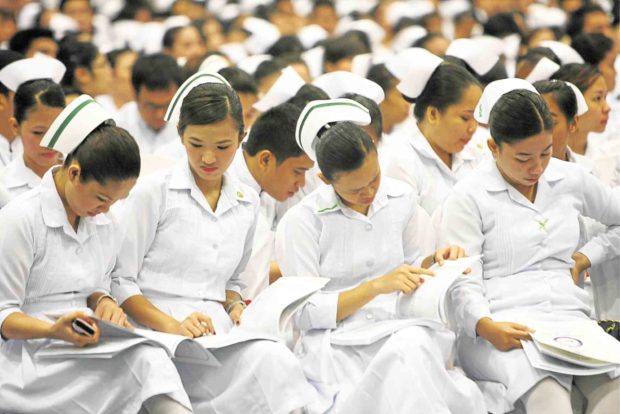
Filipino nurses (INQUIRER.net file photo)
MANILA, Philippines — President Ferdinand Marcos Jr. has supported a proposal to implement a “ladderized” program to address the “brain drain” among nurses in the country, Malacañang disclosed Thursday.
According to a Palace statement, Marcos Jr. expressed his support during his meeting with members of the Private Sector Advisory Council (PSAC) in Malacañang on Thursday afternoon.
“I like the ladderized idea for the nurses because that’s really becoming a problem – the brain drain that we are suffering,” Marcos Jr. was quoted as saying during the meeting.
“They are so good everybody wants them, and they are willing to pay for it, and we are not, or we’re not able. So we have to come up with some strategies for that,” the President added.
READ: Nurses’ exodus: Choice obvious between better future abroad, shabby treatment at home
During the meeting, Department of Health (DOH) officer-in-charge Ma. Rosario Vergeire raised the idea of a ladderized program being carried out by the University of the Philippines-Manila and select local government units (LGUs).
Under the program, UP Manila offers a two-year scholarship for midwives who, upon course completion, come back to the community to serve. Once they gain experience, they go back to UP Manila, where they get to study nursing for another two years.
“So this ladderized program, there is this counterpart with local government. So we now have a couple of local governments that we have piloted this with,” Vergeire was quoted as saying in the meeting.
Marcos Jr. said providing scholarships could help keep doctors, nurses, and medical practitioners from leaving the country.
Hike health workers’ pay
In the same meeting, according the Palace statement, the PSAC also called for a review of the salaries and benefits of nurses in the country, noting that nurses employed in government hospitals are getting higher salaries than those in the private sector.
The PSAC said the government could come up with a policy mandating equal pay for nurses working in both the public and private sectors.
According to the DOH, 51 percent of licensed nurses in the country, which is around 316,000, have already migrated. Some, meanwhile, have already opted to work in other sectors outside healthcare.
READ: Hospitals: Where have all the nurses gone?
Other issues discussed during the meeting, the Palace said, are the development of a vaccine procurement plan for new COVID-19 variants and Monkeypox, the commissioning of a study on the feasibility of local vaccine manufacturing, and a third-party review of the Philippine Health Insurance Corp. (Philhealth).
Also included in the talks were the institutionalization of ladderized nurse categories with ascending skills sets, and piloting tele-health in geographically isolated and disadvantaged areas.
The establishment of LGU Performance-Driven Incentive Plan, the commissioning of a study to review and fully digitalize the Food and Drug Administration, and the improvement of awareness of the general public on generic medicines were also tackled during the meeting, the Palace added.